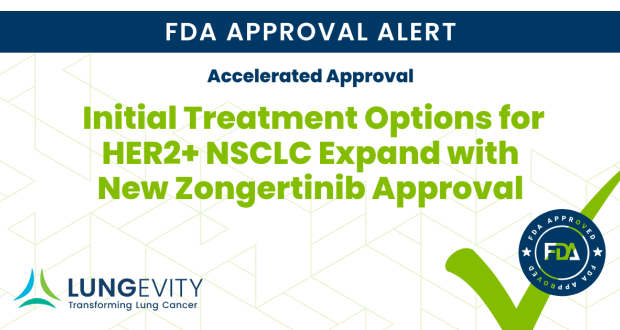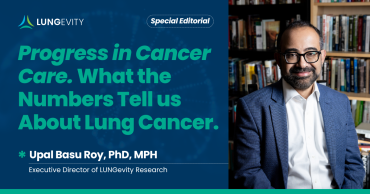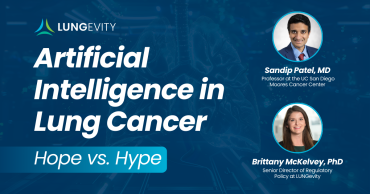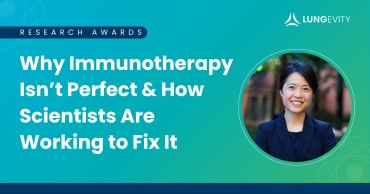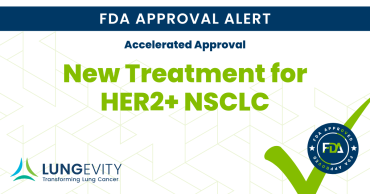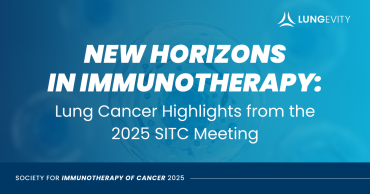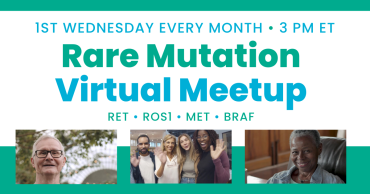-
Initial Treatment Options for HER2+ NSCLC Expand with New Zongertinib Approval
On February 26, 2026, the US Food and Drug Administration (FDA) announced the accelerated approval of zongertinib (Hernexeos®) as an initial treatment option for newly diagnosed patients with advanced...
IN THE SPOTLIGHT
-
Progress in Cancer Care: What the Numbers Tell Us About Lung Cancer
Every January, the American Cancer Society releases a Cancer Facts & Figures report. It provides a clear view of where we stand in addressing cancer. The 2026 report brings both... -
Artificial Intelligence in Lung Cancer: Hope vs. Hype
Artificial intelligence (AI) is rapidly reshaping the future of cancer care, but such dramatic innovation also brings important questions. AI has evolved from early consumer tools... -
Why Immunotherapy Isn’t Perfect & How Scientists Are Working to Fix It
The human immune system is an intricate web of checks and balances that usually excels at detecting and destroying foreign invaders, such as bacteria and viruses, while protecting... -
New Accelerated Approval for HER2-positive NSCLC
On November 19, 2025, the US Food and Drug Administration (FDA) announced the accelerated approval of sevabertinib (Hyrnuo®) to treat patients with locally-advanced or metastatic... -
New Horizons in Immunotherapy: Lung Cancer Highlights from the 2025 SITC Meeting
The Society for Immunotherapy of Cancer (SITC) celebrated their 40th anniversary at their annual meeting in National Harbor, Maryland from November 5-9, 2025. The meeting focused... -
Rare Mutations (RET, ROS1, MET, BRAF) Virtual Meetup
Rare Mutation (RET, ROS1, MET, BRAF) patients/survivors - Join us the 1st Wednesday of every month to c onnect with others who share common experiences and build your community... -
Biggest News from Berlin: Research Highlights from ESMO
Lung cancer research was in the spotlight at the European Society for Medical Oncology (ESMO) meeting held October 17-21, 2025, in Berlin, Germany. With approximately 30,000... -
The Future of Lung Cancer Starts Here
For more than two decades, LUNGevity Foundation has been a leader in advancing lung cancer research. Since 2002, we have invested $55+ million in more than 200 research projects...
Initial Treatment Options for HER2+ NSCLC Expand with New Zongertinib Approval
Initial Treatment Options for HER2+ NSCLC Expand with New Zongertinib Approval
On February 26, 2026, the US Food and Drug Administration (FDA) announced the accelerated approval of zongertinib (Hernexeos®) as an initial treatment option for newly diagnosed patients with advanced non-small cell lung cancer (NSCLC) with mutations in the HER2 gene. This approval expands the usage of this treatment from August 2025 when it was only approved for patients who have been previously treated with a systemic therapy (such as chemotherapy). Mutations in the HER2 gene (…
FDA Approves Hernexeos, the First Targeted Therapy for Adults with HER2-Mutant Advanced NSCLC as an Initial Treatment Option
FDA Approves Hernexeos, the First Targeted Therapy for Adults with HER2-Mutant Advanced NSCLC as an Initial Treatment Option
FDA approves HERNEXEOS®, the first targeted therapy for adults with HER2-mutant advanced NSCLC as an initial treatment option
FDA approves HERNEXEOS®, the first targeted therapy for adults with HER2-mutant advanced NSCLC as an initial treatment option
Advanced Nonsquamous NSCLC: FDA Grants Accelerated Approval to Zongertinib
Evaluation of the updated 2022 lung-GPA in NSCLC adenocarcinoma patients with brain metastases: analysis of prognostic factors in a German clinical cohort
Evaluation of the updated 2022 lung-GPA in NSCLC adenocarcinoma patients with brain metastases: analysis of prognostic factors in a German clinical cohort
CStone Secures MHRA Approval For Sugemalimab In Stage III NSCLC In UK
Shaheenah Dawood: EFS with Adjuvant Selpercatinib in Early-Stage RET Fusion–Positive NSCLC
Shaheenah Dawood: EFS with Adjuvant Selpercatinib in Early-Stage RET Fusion–Positive NSCLC
Inferring tumor immune microenvironment -related risk states from pretreatment H&E pathomics and clinical biomarkers to predict checkpoint inhibitor pneumonitis in advanced NSCLC: a multicenter multimodal study
Inferring tumor immune microenvironment -related risk states from pretreatment H&E pathomics and clinical biomarkers to predict checkpoint inhibitor pneumonitis in advanced NSCLC: a multicenter multimodal study
Future Outlook in HER2-Mutant NSCLC
Progress in Cancer Care: What the Numbers Tell Us About Lung Cancer
Progress in Cancer Care: What the Numbers Tell Us About Lung Cancer
Every January, the American Cancer Society releases a Cancer Facts & Figures report. It provides a clear view of where we stand in addressing cancer. The 2026 report brings both encouraging news and a sobering reminder that our work is far from over.The Big Picture Shows Real ProgressLet’s start with the good news. We have made significant strides in cancer care over the past three decades. Since 1991, the cancer death rate has dropped by 34%. This translates to approximately 4.8 million…
Artificial Intelligence in Lung Cancer: Hope vs. Hype
Artificial Intelligence in Lung Cancer: Hope vs. Hype
Artificial intelligence (AI) is rapidly reshaping the future of cancer care, but such dramatic innovation also brings important questions.AI has evolved from early consumer tools (like autocorrect on phones, customer service chatbots, and personalized shopping recommendations) to advanced systems with the potential to revolutionize biomedical discovery and patient care. While there is tremendous excitement around AI, there is also a critical need to use it responsibly.Researchers are actively…
Why Immunotherapy Isn’t Perfect & How Scientists Are Working to Fix It
Why Immunotherapy Isn’t Perfect & How Scientists Are Working to Fix It
The human immune system is an intricate web of checks and balances that usually excels at detecting and destroying foreign invaders, such as bacteria and viruses, while protecting healthy tissue. But sometimes, the checks and balances get confused and stop the immune system from doing what’s right—such as killing tumor cells. Tumor cells are good at confusing the immune system because they originate from our healthy cells. They can often avoid detection by immune cells. Through several…
New Horizons in Immunotherapy: Lung Cancer Highlights from the 2025 SITC Meeting
New Horizons in Immunotherapy: Lung Cancer Highlights from the 2025 SITC Meeting
The Society for Immunotherapy of Cancer (SITC) celebrated their 40th anniversary at their annual meeting in National Harbor, Maryland from November 5-9, 2025. The meeting focused on multidisciplinary research aiming to leverage the immune system to improve outcomes for cancer patients, including several exciting areas of growth in lung cancer-directed immunotherapy.Tumor Imaging is Growing More Powerful Advanced imaging techniques are poised to change how we understand and treat…
The Future of Lung Cancer Starts Here
The Future of Lung Cancer Starts Here
For more than two decades, LUNGevity Foundation has been a leader in advancing lung cancer research. Since 2002, we have invested $55+ million in more than 200 research projects, helping to build a robust pipeline of discoveries in early detection, treatment innovation, and health equity.Once again, LUNGevity is ready to open our annual grant cycle in 2026 with five research programs designed to address the most pressing challenges in lung cancer care. In addition, these grants ensure the…
Biggest News from Berlin: Research Highlights from ESMO
Biggest News from Berlin: Research Highlights from ESMO
Lung cancer research was in the spotlight at the European Society for Medical Oncology (ESMO) meeting held October 17-21, 2025, in Berlin, Germany. With approximately 30,000 attendees from over 100 countries, this meeting gathered an international audience of clinicians, researchers, patient advocates, and representatives from the healthcare industry to discuss cutting-edge cancer research and share practice-changing clinical trial data. We saw data from studies that aim to build upon…
New Accelerated Approval for HER2-positive NSCLC
New Accelerated Approval for HER2-positive NSCLC
On November 19, 2025, the US Food and Drug Administration (FDA) announced the accelerated approval of sevabertinib (Hyrnuo®) to treat patients with locally-advanced or metastatic non-small cell lung cancer (NSCLC) with specific mutations in the HER2 gene. This approval is for patients who have been previously treated with HER2-targeted therapies, as well as patients who have received previous treatment that did not target HER2.Mutations in the HER2 gene (also called the ERBB2 gene) are…
LUNGevity Foundation Invests $1.2 Million to Fuel Next Generation of Lung Cancer Research
LUNGevity Foundation Invests $1.2 Million to Fuel Next Generation of Lung Cancer Research
LUNGevity Foundation announced $1.2 million in research awards that are designed to strengthen the lung cancer workforce and accelerate progress across the lung cancer continuum—from early detection to treating advanced disease.“Today’s research is tomorrow’s cure. If we want to see continued breakthroughs and advancements in lung cancer, we must secure a strong pipeline of researchers dedicated to improving outcomes for people with lung cancer,” said Upal Basu Roy, PhD, MPH, Executive Director…
Celebrating Progress in Lung Cancer: From Detection to Survivorship
Celebrating Progress in Lung Cancer: From Detection to Survivorship
Over the past twenty years, lung cancer research and care have entered a new era. One filled with hope, innovation, and progress that is transforming what it means to face a lung cancer diagnosis. From groundbreaking early detection efforts to life-extending treatments, each step forward represents years of collaboration between researchers, patients, and others in the lung cancer community.Today, LUNGevity celebrates five exciting areas of progress that highlight the incredible strides made…
Veteran Voices: Surgery to Survivorship at the VA
Veteran Voices: Surgery to Survivorship at the VA
Last November, Michael O’Donnell was at the Dallas VA during Lung Cancer Awareness Month. It’s where he receives treatment for his lung cancer, but on this specific day, he was joined by LUNGevity staff to talk with veterans about screening.“My job was easy. I was at a table with Kristi Griffith [LUNGevity’s Survivorship Navigator] so that I could answer questions as someone who uses the VA to get treated for lung cancer,” says Michael. Michael is a veteran of the Vietnam War and uses the…
Researcher Goes Against the Grain: Brings New Hope for Patients with BRAF Fusions
Researcher Goes Against the Grain: Brings New Hope for Patients with BRAF Fusions
BRAF is an important signaling protein that regulates how normal cells grow and multiply through the MAPK (mitogen activated protein kinase) signaling pathway. However, changes in the BRAF gene can cause the cells to grow unchecked and develop into a tumor. This can lead to many types of cancer, including melanoma, colorectal, thyroid, and lung cancers. Researchers estimate that 4%-15% of tumors, from all types of cancer, are driven by changes in the BRAF gene. In lung cancer…
New Insights in Treating Metastatic Lung Cancer from WCLC 2025
New Insights in Treating Metastatic Lung Cancer from WCLC 2025
For people with advanced or metastatic non-small cell lung cancer (NSCLC), the treatment landscape has changed dramatically in recent years. Researchers are learning how to optimize existing therapies and are exploring entirely new treatment approaches. At the 2025 World Conference on Lung Cancer (WCLC), several studies highlighted progress in treating newly diagnosed individuals as well as those who need new options after standard therapies stop working. Combining Chemotherapy and…
6 Tips for Managing Scanxiety
6 Tips for Managing Scanxiety
Read time: 4 minutes.Scanxiety is a term used for the anxiety someone feels as a medical exam, like an MRI or CT scan, approaches. It can come with feelings of dread or worry, as well as “what if” thoughts focused on receiving bad news, like the return or growth of a cancerous tumor. Scanxiety can be intense and intrusive, and you might find it difficult to focus on other thoughts or tasks. Many people, especially those who did not experience anxiety prior to their diagnosis, might feel…
First Oral Targeted Therapy Approved for Advanced HER2+ NSCLC
First Oral Targeted Therapy Approved for Advanced HER2+ NSCLC
On August 8, 2025, the US Food and Drug Administration (FDA) announced the accelerated approval of zongertinib (Hernexeos®) to treat patients with unresectable or metastatic non-small cell lung cancer (NSCLC) with mutations in the HER2 gene. This approval is for patients who have been previously treated with a systemic therapy (such as chemotherapy). Mutations in the HER2 gene (also called the ERBB2 gene) are responsible for approximately 2-3% of nonsquamous NSCLCs. These mutations…
Why Do Some People Who Have Never Smoked Get Lung Cancer?
Why Do Some People Who Have Never Smoked Get Lung Cancer?
As tobacco use has declined in recent years, we have seen a new demographic of lung cancer patients emerge. Lung cancer in individuals who have never smoked (LCINS) is becoming more common. These people are often younger women with no history of tobacco exposure.Researchers are working to understand the needs of this growing population by identifying other risk factors for lung cancer, such as family history and environmental exposures. They are also studying the molecular underpinnings of this…
2025 ASCO: Highlights of Lung Cancer Research
2025 ASCO: Highlights of Lung Cancer Research
The annual meeting of the American Society of Clinical Oncology (ASCO) once again brought together nearly 50,000 members of the oncology community. From May 30 – June 2, researchers, oncologists, and patient advocates had first-hand access to the latest cancer research news. The theme for the 2025 ASCO conference was “Driving Knowledge to Action: Building a Better Future.” This theme was represented through several presentations during the conference that showcased how the cancer…
Taletrectinib Approved for Locally Advanced and Metastatic NSCLC with ROS1 Rearrangements
Taletrectinib Approved for Locally Advanced and Metastatic NSCLC with ROS1 Rearrangements
On June 11, 2025, the US Food and Drug Administration (FDA) announced the approval of taletrectinib (Ibtrozi™) to treat patients with locally advanced or metastatic non-small cell lung cancer (NSCLC) with ROS1 rearrangements. Taletrectinib is a next-generation, highly specific kinase inhibitor of ROS1 that was designed to treat ROS1+ NSCLC in patients whose tumors have developed drug resistance to previous targeted therapies as well as a first treatment option for newly diagnosed patients…
Surviving LMD: Michelle Never Settled for “No”
Surviving LMD: Michelle Never Settled for “No”
Michelle knew what was wrong. She knew the headaches, regular vomiting, ear popping, and “whooshing” sounds in her head were all signs of leptomeningeal disease (LMD). The issue, however, is that LMD is so rare—only diagnosed in 5% of people with cancer—she had to advocate for the testing to prove it.“I called my clinic and said I needed a brain MRI because I think I have LMD. They didn’t want to schedule one, so I said, tell my doctor I’m demanding a brain MRI. I can tell him directly if I…
New Treatment Approved for NSCLC with High Level of c-Met Protein
New Treatment Approved for NSCLC with High Level of c-Met Protein
On May 14, 2025, the US Food and Drug Administration (FDA) announced the approval of telisotuzumab vedotin-tllv (EMRELIS™) to treat patients with locally advanced or metastatic non-small cell lung cancer (NSCLC) with high levels of c-Met protein who have been previously treated with a systemic therapy, such as immunotherapy or chemotherapy. This ADC, or antibody-drug conjugate, is the first approval of its kind. This ADC treatment is designed with two key elements. One part of the…
The Promise of PROTACs for Treating RET+ Lung Cancer
The Promise of PROTACs for Treating RET+ Lung Cancer
RET proteins are a type of receptor tyrosine kinase—an important group of signaling molecules in healthy cells. When RET proteins are turned “on” and “off” in healthy cells, they control the function of other proteins. This cascading effect allows the cells to manage important cellular functions such as cell growth through protein signaling pathways. When specific changes (such as mutations or fusions) occur in RET proteins, they can become hyperactive, disrupting many important…
Watch HOPE Summit Videos
Watch HOPE Summit Videos
HOPE Summit 2025 was filled with messages of hope, meeting new and hugging old friends, and of course the inspirational and informative sessions that help people live well with lung cancer. For the first time ever, select sessions were recorded for those who weren’t able to attend, and for those who did attend to rewatch what resonated. View the entire collection here or see below for the sessions you want to watch.HOPE Summit 2025 Recorded SessionsKeynote: Breathing Beyond Boundaries…

